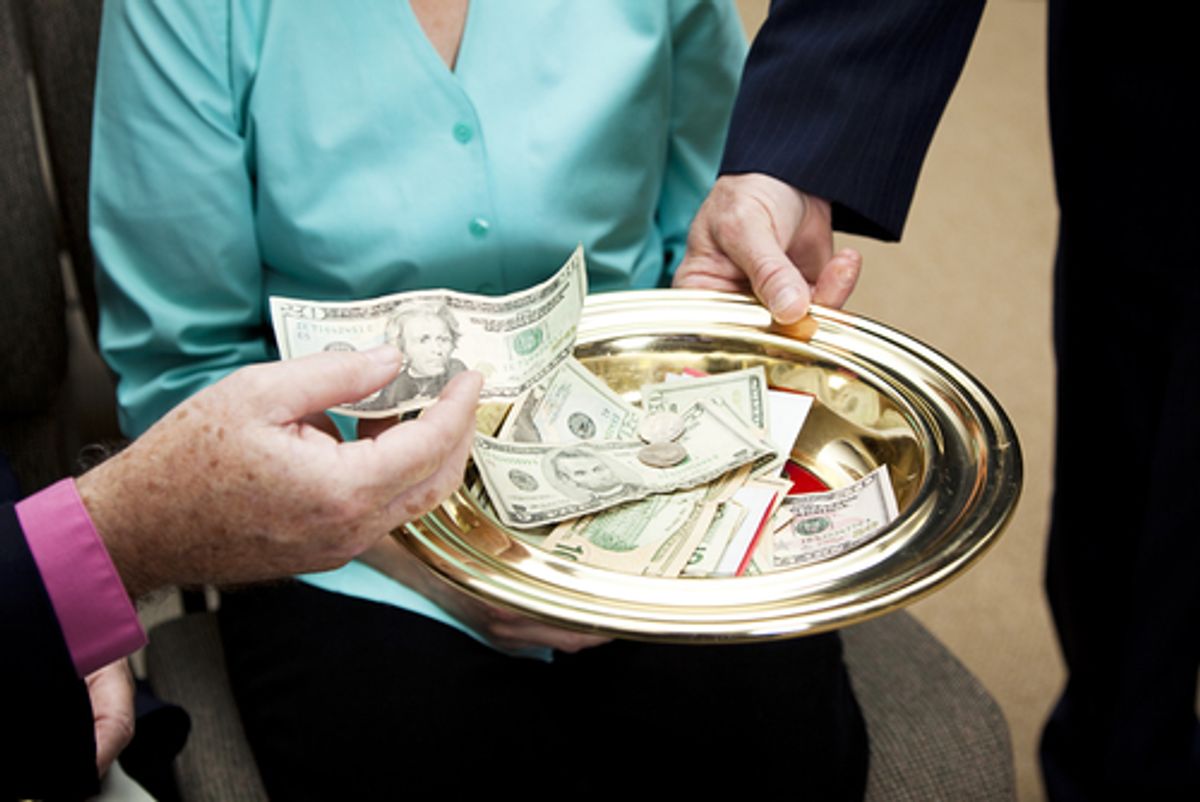 Americans give a lot of money to religion—but not in the ways we usually think.
Americans give a lot of money to religion—but not in the ways we usually think.
These are among the findings of the National Study of American Religious Giving, as distilled into a report released today entitled Connected to Give: Faith Communities. The report is third in a series of documents crunching the large amounts of data in the national study, with at least three more yet to come.
Unlike previous data sets, the current study captures a wider swath of religious giving—not just that to churches, synagogues, mosques, and the like, but to religiously-affiliated organizations like Catholic Charities and the Salvation Army. When that larger group is included, 73%—almost three quarters—of American giving goes to religious organizations.
This point is significant for several reasons. First, it highlights the importance of religion in American philanthropic life. Religion is where American give, and a reason why they give. Along with the 73% statistic, the study revealed that 55% of Americans say that their religious orientation (a weird locution, but one the study chose) motivates their giving.
That may not seem like a lot, but just crunch the numbers for a minute. The study found that 65% of religiously-affiliated people donate to congregations or charitable organizations. (More on that statistic later.) 80% of Americans are religiously affiliated. And 65% of 80% is just about… 55% of the total. In other words, the religious people who are giving say they’re giving because of religion. And they’re overwhelmingly giving to religion as well.
Second, and relatedly, this data shows just how much of America’s tax deductions are a boon to religious organizations. When we think about charitable gifts, most of us probably include religious institutions within a laundry list of good causes: Save the Whales, the American Cancer Society, and so on. In fact, three quarters of American giving—and three-quarters of the concomitant tax benefit – goes to religion.
While law students still quibble over whether the Bible Club can meet in the school gym, our tax policy, school voucher programs, and “faith-based implementers” of domestic and international policies constitute massive giveaways to religious organizations that artificially inflate their power and appeal.
Third, it’s these “religiously-identified organizations” —RIO’s in the hideous acronymization of Washington—that are at the center of the current controversy over religious exemptions to civil rights laws. Almost all Americans believe that some religious institutions should be exempt from some laws – your priest should not be forced to marry two lesbians, for example. But that narrow exemption is a trickle compared to the flood of the RIO.
RIOs are big business. Fully 69% of donations made for non-religious purposes went to religiously identified organizations. And if the Religious and Tea Party Right(s) have their way, these institutions, supported by non-religious-purpose donations, can fire gays, banish contraception from their employees’ health plans, and maintain discriminatory practices like refusing to allow children to be adopted by same-sex families.
(Incidentally, the religious right has had its way. The version of the federal Employment Non-Discrimination Act (ENDA) supported by the mainstream LGBT movement excludes all RIOs from coverage.)
Probably the most notable statistics, though, are those which compare religious and non-religious philanthropy. Religion is supposed to make us better people, which includes, I assume, being more generous. So, is it the case that religious people give more generously than the non-religious?
Well, yes and no. Remember that statistic, that 65% of religious people donate to charity? The non-religious figure is 56%. But according to the study, the entire 9% difference is attributed to religious giving to congregations and religious organizations. So, yes, religion causes people to give more—to religion itself.
What did Richard Dawkins say? The primary function of a meme is to replicate itself. Which is what religions do, brilliantly.
As between different religions, the numbers are fairly consistent—except for American Jews, who give more to secular causes than anyone else. Coming in the wake of the recent Pew Survey on American Jewish Life, these findings may shed new light on Jewish secularism, a trend which has greatly worried the Jewish establishment. Maybe the secular social-justice commitments of American Jews are a sign of Judaism’s success.
So, most religious people are equally generous; they only give more than non-religious people because they give to religious organizations; and they, like the rest of us, give to overwhelmingly religious organizations. For better or for worse.



Shares